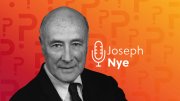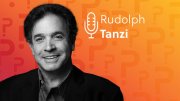How do presidents incorporate morality into decisions involving the national interest? Moral considerations explain why Truman, who authorized the use of nuclear weapons in Japan during World War II, later refused General MacArthur’s request to use them in China during the Korean War. What is contextual intelligence, and how does it explain why Bush 41 is ranked first in foreign policy, but Bush 43 is found wanting? Is it possible for a president to lie in the service of the public interest? In this episode, Professor Joseph S. Nye considers these questions as he explores the role of morality in presidential decision-making from FDR to Trump.
Transcript (the following was prepared by a machine algorithm, and may not perfectly reflect the audio file of the interview):
Jonathan Shaw: Welcome to the Harvard magazine podcast, "Ask a Harvard professor." In a presidential election year, this season's podcast will focus on the issues and policies that will face the 46th president when he or she takes office. I'm Jonathan Shaw. We'll spend today's office hours with Joseph S. Nye, Jr., University distinguished service professor emeritus and former Dean of Harvard’s Kennedy school of government. Professor Nye has served as assistant secretary of defense for international security affairs, as chair of the national intelligence council, and as deputy under secretary of state. In a recent survey of international relations scholars, he was ranked as the most influential on American foreign policy. Among his numerous books, the most recent is, Do Morals Matter? Presidents and Foreign Policy from FDR to Trump. Welcome professor Nye.
Joseph Nye: Glad to be here.
Jonathan Shaw: Everyone knows that leaders sometimes have to make difficult choices given the complexity and constantly changing landscape of international relations. Where do you begin when evaluating the role of morality in presidential foreign policy?
Joseph Nye: The most important thing is to realize that morals do matter. There’s a conventional wisdom that everything just follows national interests. And then politicians come along and sprinkle a little morality on as icing on the cake, but interests bake the cake. That kind of cynical view I think is incorrect. And if you have that view, you’re going to get history wrong. And so one of the things I tried to do in this book is to show there’s some real cases where presidents acted differently. My favorite of these is Harry Truman. Truman famously dropped the atomic bomb on Hiroshima and Nagasaki to end World War II. But when Douglas MacArthur asked him to drop 25 atomic bombs on Chinese cities after the Korean war bogged down in 1950, Truman said, no, he wasn’t going to do it. That was basically a moral decision. The Soviets at that point didn’t have a nuclear deterrent against us. They had the bomb but not a delivery system. Truman just said he didn't feel that was the right thing to do to kill that number. Women and children mentioned that he’d made that decision differently. How different the world would look today if nuclear weapons had become so-called normal weapons. So we have to take morality seriously.
Jonathan Shaw: And when you evaluate good moral reasoning, what are the dimensions that you look at?
Joseph Nye: Well, all too often people will just say, Oh, that’s a wonderful speech. It called for human rights or for freedom or whatever. And that’s sometimes called moral clarity. I think that’s mistaken. Basically, there are three dimensions to morality that we all use ourselves pretty much every day. One is our intentions, a second is the means we use, and the third is the consequences we have and what I call 3D morality. Three-dimensional morality takes all three of those into account. So it’s not enough just to have good words or good intentions afterward. The proverbial road to hell is paved with good intentions.
Jonathan Shaw: Right. Could you walk us through each of these three dimensions with examples of notable successes and failures?
Joseph Nye: Well, let me give you the case of George W. Bush who talked about our freedom agenda in Iraq. His former press secretary, Ari Fleischer said you had to praise George W. Bush for his moral clarity. Well, it’s one thing did you talk about freedom and a freedom agenda bringing democracy to Iraq. But if you don't have the capacity, i.e. the means to do it, and you don’t understand the context of how to do it, you can make an awful immoral mess, which costs an awful lot of lives and treasure. And that’s a case where there was a great divergence between George W. Bush’s statements, which had sometimes a moral clarity, and his consequences, which were often, when you look at the aftermath of the Iraq war, highly immoral.
Jonathan Shaw: So is that a case of what you describe in your book as contextual intelligence?
Joseph Nye: That’s right. I mean, the problem for George W. Bush, just to stick with that example, is that he didn't really understand Iraq and the idea that we could go in and with force create a functioning democracy or bring freedom to the Iraqi people in the sense that it meant he didn’t have a clue about the context. The net effect of that was it was very easy for the American military to remove Saddam Hussein in six weeks as we did, but we didn’t have the capacity to build a democracy in Iraq. And in the effort to do so, we helped to stimulate the rise of basically the terrorist movements in the region, both Al Qaeda and the Islamic state. So the negative effects of having an inadequate contextual intelligence were immoral consequences.
Jonathan Shaw: Donald Trump is often called out for speaking untruths, but fewer people know that FDR lied too, perhaps more frequently than he should. Would you suggest that the lies they told are different from a moral perspective?
Joseph Nye: I think they are. I mean, I was once talking to a taxi driver who asked me what I thought of Trump. And I said, I did not think he had done a good job. And the taxi driver said, well, Why? I said, well, because he lies too much. And, the taxi driver replied, “Everybody lies, and politicians particularly.” Well. There’s some truth to that. I suspect if we all look inside our own hearts, we’ll see that occasionally we’ve told lies. But there’s a difference between a lie, which is self-serving and a lie which is public-serving. Franklin Roosevelt famously on the eve of WWII wanted to get the Americans into the war against Hitler, but he found himself bucking an isolationist trend in public opinion. So when an American destroyer actually attacked a German submarine in the North Atlantic, FDR told the American people that the German submarine had attacked the American destroyer. That was a lie. Roosevelt was doing it not for his own personal benefit. He was doing it basically to try to get the American people to wake up to the threat that Hitler posed to us.
Now a lie is a lie, but that’s a little bit more justifiable than a lie which is purely for your personal benefit. If you look at The Washington Post which has done a fact checking on president Trump, they’ve discovered something like more than 10,000 lies in his three years in office, but it’s not just the number which is extraordinary. It’s also that so many of them are self-serving, that they’re not in the public interest. They’re basically for his private interest. And that’s one of the things that came up with the impeachment inquiries about the situation in Ukraine, which was that a lot of what was happening about getting the Ukrainians to investigate the Bidens related to the president’s personal interest rather than the national interest. So that’s a difference between what Roosevelt did, which can be debated, but also an awful lot of the 10,000 lies that have been attributed to a president Trump have been in the self-serving category.
Jonathan Shaw: Now you’ve used your three dimensional analysis to look at all of the presidents since 1945. Which in your view have been the most successful in terms of foreign policy? And which have been the least effective?
Joseph Nye: Well, if you take all three dimensions, I’ve ranked George H. W. Bush, the first Bush—we sometimes call him Bush 41 for the number of his presidency—as probably right up near the top. So Bush 41 was able to preside over the end of the cold war without a shot being fired. And he also was able to repel Saddam Hussein’s invasion of Kuwait, uh, using a UN security council resolution to, and a UN authorized force. And I think the general nature of the times in 41 was president were very turbulent, huge changes. And he steered us through those without any catastrophes. And we came out all the better for it. So I rank him very high. Also rank what I call the founders, Roosevelt, Harry Truman and Dwight Eisenhower, who basically saw the mistakes the United States made in the 1930s of turning isolationists and failing to preserve or create an international system that could produce global public goods. And they vowed that they period after world war two when the Americans were the dominant power, that we would create an international structure in which it would be possible to have a more global order and one which would benefit us but would benefit other countries as well. So I ranked Bush 41 and the three founders of what’s called the liberal international order, FDR, Truman, and Eisenhower as my top four.
Jonathan Shaw: And who’s at the bottom?
Joseph Nye: Well, I don’t want to sound too negative. Oh, and the current president, he hasn't finished his term, he may still pull a rabbit out of the hat, but the bottom rank is Trump, Bush 43, George W. Bush, but also Lyndon Johnson, who made such a mess out of the Vietnam war, though he had other virtues on the domestic side. His foreign policy ranks him down there and Richard Nixon who did some good things in foreign policy, but whose general posture, I think, in terms of the way he bungled the end of the Vietnam war where 21,000 American soldiers died and countless Vietnamese for the sake of what was basically a decent interval that lasted at best a few months. I think it puts him down there too. So that’s the, the top four and the bottom four although it’s perhaps premature to assess the Trump administration’s foreign policy.
Jonathan Shaw: You do note some significant differences after 2016. What are some of those changes?
Joseph Nye: Well, I think the most important is that in the 70 years after WWII, every American president basically tried to preserve this liberal international order in which the Americans help to provide global public goods, things that could benefit everyone, including ourselves, but others could participate in. And that was based also on a structure of alliances, NATO, the U. S. Japan Alliance, and so forth. Trump was the first president since WWII who basically does not care about those international institutions and downgrades those alliances. That’s a big change. I mean, whatever you might say about Nixon or Johnson or anyone else, they still were supportive of that liberal international order. Trump is the first president who’s basically turned his back on it.
Jonathan Shaw: Going back to the role of morality and presidential decision making, what role did the Carter presidency play in elevating human rights as a consideration?
Joseph Nye: Well, Jimmy Carter was quite unique. He was a born again Christian who even taught Sunday school classes when he was serving as president in the White House. And he felt very strongly about human rights. So while we’ve always had rhetoric about human rights, for Carter it was raised to a priority. So he appointed an assistant secretary for human rights in the state department, Pat Darien, and he instructed his national security council staff and secretary of state Cyrus Vance to do more about human rights. And they did. I remember I was then serving in the state department. I remember going with Vance down to Argentina where Carter had been highly critical of their human rights by the military junta that ruled the place. And we were treated very coolly by the Argentine military when we were there. I went back to Argentina as a professor at Harvard two decades later, and the warmth of the feelings about America were quite extraordinary. I said, how can there be such a change? They said, because the people whose fingernails were being torn out when you were here before are now in power today.
Jonathan Shaw: Wow. How did Ronald Reagan's moral compass guide his decisions around nuclear nonproliferation?
Joseph Nye: Well, Reagan was a great rhetorician and very capable of simplifying sometimes over simplifying issues, but making it very clear what morality was. And many people think that that’s what ended the cold war. But the interesting point is Reagan also knew how to bargain and he saw in Mikhail Gorbachev, somebody he could work with and his capacity to meet Gorbachev halfway to bargain to set a framework was actually as important as his so-called moral clarity.
Jonathan Shaw: You've talked about the importance of soft power as opposed to hard power, such as military force or economic sanctions. What role did morals play in soft power?
Joseph Nye: Well, soft power is the ability to get what you want through attraction rather than coercion or pavement. And to the extent that you can use soft power, you can economize on the use of hard military or economic power. It's essentially using honey instead of carrots and sticks and it allows others a greater chance to participate. If you use hard power—if I take out a gun and threaten to shoot you if you don't give me your money—what you think doesn't matter at all. If I tried to persuade you to give me your money, I might still be misleading you, but you have a lot to say in the outcome. So I think you can make a case that soft power allows for more moral choices, not always though. It can be abused and misused, but presidents who think only in terms of bombs and bullets or economic sanctions mistake the importance of soft power and its role in morality.
Jonathan Shaw: Can morality itself be an attractant?
Joseph Nye: Absolutely. Yeah. No, absolutely. I mean America’s reputation for protecting human rights for standing up for individual liberties and freedoms is a great source of soft power and attraction in the rest of the world. People complain about how we’re going to compete with an authoritarian China, which is so efficient. I think we can compete, but one of the areas that we will compete in is the fact that people would rather see an open society than one in which millions of people are locked up as in shin Jong in detention camps.
Jonathan Shaw: Right. You mentioned that the Trump administration has been less interested in sustaining international institutions. Is morality a key part of U.S. participation in those institutions? Yes, I think so. Essentially when you have to work with others and bargained with others, you allow others to have a degree of voice. That doesn't mean that you're not pursuing yourself interest, but there's a difference between threes like America first, which means it's only my self interest and a phrase which sort of says, you know, America in a broader global interest. And I think those institutions, whether it's the UN or NATO or so forth, allow others a voice.
Joseph Nye: Yes, I think so. Essentially when you have to work with others and bargained with others, you allow others to have a degree of voice. That doesn’t mean that you’re not pursuing yourself interest, but there’s a difference between a phrase like America first, which means it's only my self interest, and a phrase which sort of says, you know, America in a broader global interest. And I think those institutions, whether it’s the UN or NATO or so forth, allow others a voice. It allows others to participate. So the slogan America first, pure and simple, sort of has the connotation that everybody else is second. On the other hand, if you’re doing America first within the framework of an institution where others have a voice and ability to participate, then it doesn't have that sharp hard edge to it.
Jonathan Shaw: You predict that going forward, there’ll be more instances in which American power is exercised cooperatively together with other nations. Would you say that is due in part to the transnational nature of problems such as climate change, cybersecurity and controlling pandemics?
Joseph Nye: Yes. I mean, there are many issues now which are outside the control of governments. The ones you just mentioned are perfect examples. No one government can handle those issues by themselves. It's going to take cooperation. For example, today on climate change, which is I think a major issue which we have to come to terms with China is the world's greatest emitter of CO2, and so we can have a perfect policy at home and if the Chinese don't cooperate, doesn't do any good. On the other hand, we and the Chinese together are the two largest polluters. If we can reach agreements with the Chinese under the Paris agreement and work with them, then we can begin to have a serious discussion about the problem of de-carbonization of our economies. And I think in the Obama administration, and one of the interesting things to see the progress that Obama and Shujing ping made from the UN Copenhagen conference in 2009 where we and the Chinese were it loggerheads to the Paris climate Accords in 2015 where we and the Chinese had similar positions. So I think that’s an example where you think of power with another country, not just power over another country.
Jonathan Shaw: What about the rising military and economic power of other nations such as China? How should the U.S. react to China’s rising role in international affairs?
Joseph Nye: Well, the rise of China is going to be, or is already one of the major facts of the 21st century. And if we get it wrong so that we wind up with something like the way the rise of Germany, uh, who was perceived as a threat by England at the beginning of the 20th century and it led to WWI. So it will be a disaster or a highly immoral outcome. So we have to figure out, how do you work with China, balance Chinese power, as opposed to China on somethings where they are essentially tilting the or trying to tilt the playing field in their favor and at the same time be able to work with them when it's in both our interests. I call this not just a strategic competition, but a cooperative strategic competition. We have to pay attention to both the competition and the cooperation aspects. So that means that we can oppose China's efforts to extend its jurisdiction into the South China sea by mounting Naval freedom of navigation operations, which we do. And at the same time work with China on climate. And I think the United States, whoever is president, uh, after Trump, whether it’s a moderate Republican or a Democrat, will probably rejoin the Paris climate Accords. And in that context, we will work with China on that issue while at the same time opposing China on some other issues. And one of the issues where we’ll probably continue to have opposition is areas of technology which affects national security. For example, the problem of not allowing Huawei or other Chinese companies to build the next generation of telecommunications technology, so-called 5g, fifth generation. So there’ll be areas of difference, areas of cooperation. And the question is, can the American people learn to walk and chew gum at the same time. We understand a policy where it’s not a new cold war, but it’s an area. Will there be a strategic competition and a cooperative relationship simultaneously?
Jonathan Shaw: What, in your view, is the greatest challenge facing future presidents in their foreign policy decisions? Is it the risk of overreacting to the rise of China or something like that?
Joseph Nye: Well, if we overreact to China and follow these projections that we’ll wind up in a new cold war with China, that would, I think have very negative effects for us and for the world. So one major threat to a peaceful and more moral 21st century is failure to manage the relationship with China appropriately. But another one is failure to come to terms with these new transnational issues where you're just talking about climate change is real. We’ve got to do something about it. Cyber security is a major issue. How are we going to deal with artificial intelligence in the way it affects our, not just employment, but military relations? There are all sorts of issues in which a president is going to have to develop his or her contextual intelligence in ways that are much more complex than we've seen in the past if we're going to have a good outcome for our foreign policy.
Jonathan Shaw: Wonderful. Thank you for joining us today.
Joseph Nye: It’s my pleasure.
Do Morals Matter? Presidents and Foreign Policy from FDR to Trump is published by Oxford University Press.
Ask a Harvard professor is hosted by Jonathan Shaw and Marina Bolotnikova, and produced by Jacob Sweet. Our theme music was created by Louis Weeks. This second season was sponsored by the Harvard University Employees Credit Union and supported by voluntary donations from listeners like you. To support the podcast, visit harvardmagazine.com/supportpodcast. If you enjoyed this episode, please consider rating and reviewing us on iTunes. Contact us with questions at harvard_magazine@harvard.edu.











